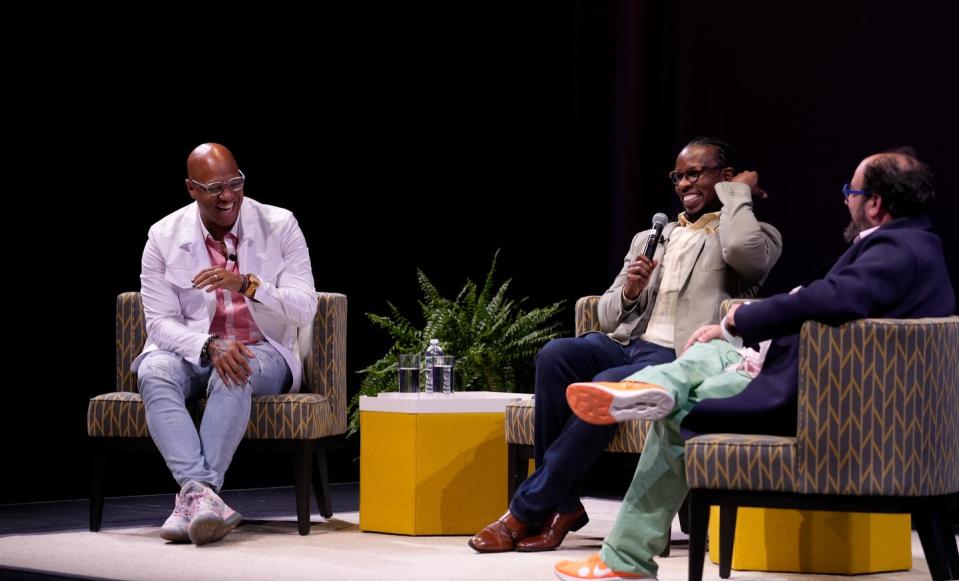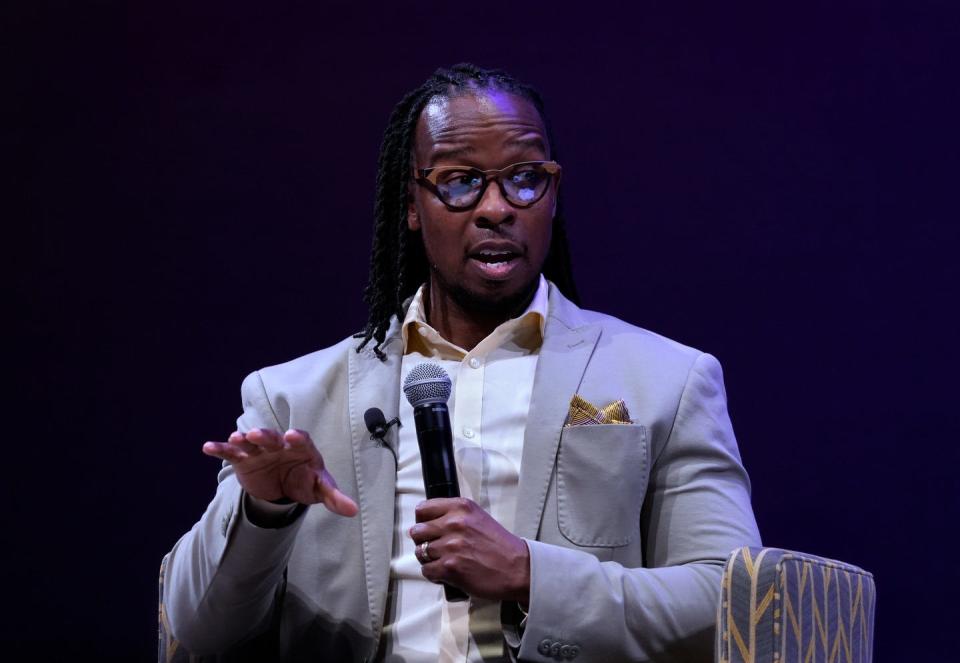'How to be an anti-racist,' book bans and how America could teach about race in schools
Jen Francazio teaches preschool.
It’s that wonderful and at times a little bit wild age when children are just beginning to form their ideas about the world. Kids, she said, are really good at the diversity, equity and inclusion ideals that Brown Fox Point Early Childhood Education Center espouses. They don’t struggle with her presenting in gender-nonconforming ways, for example.
“What I'll see is kids who can identify my gender very easily or ask with no discomfort,” she said.
But then, they see in a book, for example, the girl teachers almost always have long hair and wear skirts, or a “wacky adult,” as she likes to frame it to the kids, gives them some other new construct about race or gender.

Which feeds into her big question. The one that she stood up in a crowd of educators and parents gathered at Moses Brown School in Providence to ask of Ibram X. Kendi, author of "How to Be an Anti-Racist" and "Stamped from the Beginning," and cartoonist and professor Joel Christian Gill, who recently adapted "Stamped from the Beginning" into a graphic novel.
“Not only did racism and capitalism come to this country at the same point, so did our education system,” she said. So, how do educators function in the education system “that was rooted and founded in racist ideals, as anti-racists that are trying to teach anti-racists?”
In many ways, this was the central question of the panel discussion jointly held by Moses Brown School, Curiosity & Co. and Reading with Robin, and guided by Seth Goldenberg, author of "Radical Curiosity: Questioning Commonly Held Beliefs to Imagine Flourishing Futures." But it’s also one of the big questions in our culture that plays out in education. Arguments about book bans and whether Critical Race Theory should be taught in schools, in some ways, boil down to questions about how America should teach race.
Banned books: Books by Kendi, Reynolds, Steinbeck among most objected to in 2020
The book "Stamped," which Kendi wrote while living in Providence around 2012 and Gill recently transformed into a 278-page comic, takes its title from a speech Confederate President Jefferson Davis gave on the floor of the U.S. Senate in 1860, when he said, “the inequality of the white and Black races was stamped from the beginning.”
What Kendi puts forward is that these racist ideas were stamped onto America from the beginning, and the book, in all of its forms, painfully outlines that these ideas have continued to hold sway in American culture and how, to quote the epilogue, “the three oldest and most popular strategies Americans have used to root out these ideas: self-sacrifice, uplift suasion and educational persuasion,” have continued to fail us.
The argument is that a new option is needed, one rooted in “intelligent self-interest" so people, particularly white people, fight for an equitable, anti-racist society.

Kendi, who received a standing ovation when he walked into the room, told the crowd that while “we’ve been taught the term racist is an identity,” in his work he’s found “the term racist should be understood as a descriptive term that describes what a person is being at any moment based on what they are saying or doing or not doing.”
Because, he went on to say, someone can say something racist one moment, but if they then receive feedback on the idea and acknowledge that they were wrong and the idea was racist, then they are being anti-racist in “the very next moment.”
It’s hard, he said, for anyone to stay dry in a society that is “constantly being hosed with racist ideas,” but moving past denial, he said, has long been the key.
“You’ve got to constantly figure out at what level of resistance are you going to decide to practice,” Kendi said in answer to Francazio’s question. “More [of] a structural resistance, where you try to ... organize with others to topple the system? Or are you going to be that individual teacher who figures out day in and day out how to teach in an anti-racist manner? Because we are going to need both.”
“And especially preschool teachers, because studies show it’s right around preschool that our young people start attaching negative and positive quality to skin color,” he continued.
In Kendi's own words: Republicans help maintain racism by undermining critical race theory in public education
Gill, who rallied against late-stage capitalism and how “ridiculous” the persistence of racism has been, advised to “flip tables.” To find the courage to be the person that says in a faculty meeting that “grades are dumb” and then send the research explaining why later. And to remember that students have “never been on the wrong side of history.”
For Francazio, it was meaningful to be in a community and “know that other people are doing the work.”
“It’s also just incredibly helpful to hear these people who are doing the work at a higher level,” she said. “I get to take their absolutely beautiful metaphors and ideas and have that in my heart tomorrow when I speak to kids about drawing their noses.”
This article originally appeared on The Providence Journal: Ibram X. Kendi, Joel Christian Gill discuss anti-racist education

